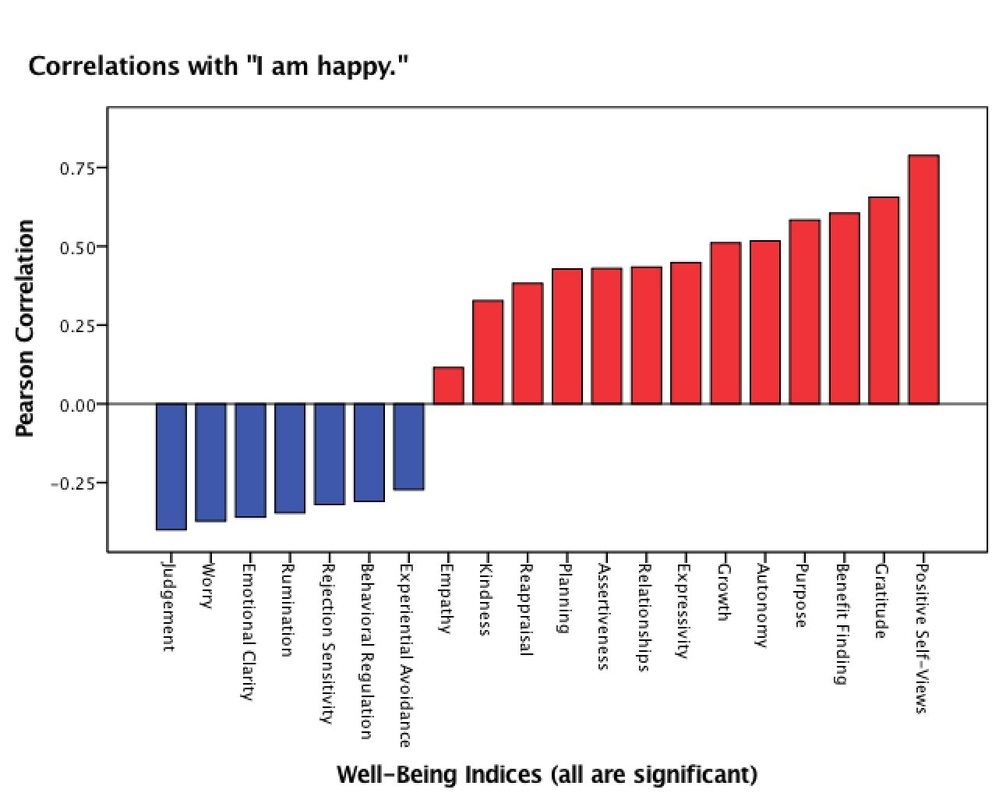What is the key to being happy? It’s a question with a highly sought after answer.
New data published last week from Dr. Tchiki Davis revealed that positive self-views (which emerge from self-esteem, self-acceptance, and self-worth, among other things) was the best predictor of happiness.
So why is thinking positively about ourselves such a massive component in our happiness, when there are so many other contributing factors, like meaningful relationships, appreciating good things and emotional processing?
The reason? Our perception of ourselves not only affects how we feel; it also affects our thoughts and behaviours.
When we feel bad about ourselves, we unconsciously act in ways that end up confirming our beliefs. For example, if we feel like we are not good enough for a good relationship, a good job, or financial stability, we end up sabotaging ourselves along the way, whether it be with insecurities, not pursuing them with the effort required to achieve, or just giving up.
1. Understand what you need to be happy
When we don’t feel happy within ourselves, it’s easy to believe that there is something underlying wrong with us; it feels fundamental and permanent. However, in actuality, it’s just because we don’t know what we need to be happy: what will make us feel positive about ourselves, and increase our self-worth.
We tend to feel bad about ourselves when we feel powerless in meeting our needs. The problem is, it helps if you actually know what your needs are.
Everyone has different needs they require to be fulfilled, in order to be happy. Many people feel that they need to have children; this is one of those things that they need to do in this life. Other people need to travel. Some people need to love what they do for a living. Everyone is different.
It’s really important that you don’t start demanding other people fulfil your every need. Other people aren’t in charge of your happiness, instead, clarify for yourself what you need.
2. Forgive yourself
What about past mistakes have you made which you can’t stop thinking about? You know, the things you’re not so proud of? Almost everyone has said something hurtful, forgotten an important event, or betrayed someone they love.
Our mistakes do not define us. They do not make us ‘good’ people or ‘bad’ people. If we learn and grow from them, then they make us better people, providing we actually learn from them. To develop positive self-views, you need to remember that everyone makes mistakes. Forgive yourself, be compassionate towards yourself, and give yourself credit for trying not to make the same mistakes again.
3. Live a life true to you
If your needs are being met, this step is easy. Just remember what makes you happy, and don’t deviate far from a life which is true to you.
But what if your needs aren’t being met? What if you are just pretending to live a life you want? You have to start thinking about how you will communicate your needs, how you will start creating a life that meets your needs, and how to incorporate you world as it is, to make sure you do.
Standing up for yourself and living a life that is authentically yours generates positive self-views.
4. Appreciate every little thing that make you, you
There is only one you. There will never be anyone on this earth like you. We are unique, amazing and all possess different qualities. When we cherish our quirks and celebrate our flaws, we begin to develop a deep love for ourselves just as we are. Instead of focusing on all the things wrong with us, self-appreciation enables us to derive deep satisfaction from being uniquely us.
While celebrating your quirks, don’t forget to keep growing as a person. Keep your eyes and ears open to the people you trust. Listen when they tell you that you have work to do on yourself. It doesn’t make you bad, just human. People you care about will be the ones that help you distinguish between flaws that need acceptance and flaws that need fixing. (Remember, you want others to get their needs met, too.) This part is crucial, and it keeps us from sliding out of self-love and into complacency.

Furthering this research, Dr Tchiki also found 7 happiness groups that you can use to more efficiently increase your overall happiness:
Learn 1 emotion skill from each of the 7 happiness groups to more efficiently increase your happiness…
The Seven Happiness Groups:
Negative thinking – The ability not to generate or dwell on negative thoughts and experiences.
Emotional intelligence – The ability to understand your emotions and emotional processing.
Coping – The ability to resist using unhealthy behaviors to avoid or manage emotions.
Social interaction – The ability to develop strong, supportive relationships.
Authenticity – The ability to be yourself and live your life your life according to your values.
Forward movement – The ability to continue moving forward towards your goals and life purpose.
Positive thinking – The ability to respond to life’s ups and downs with a positive perspective.
Change the way you look at yourself, and you will change everything.



